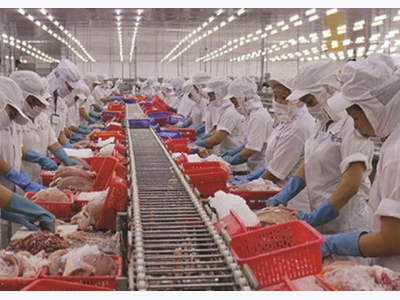United States recognizes Vietnams pangasius inspection system

Vietnam is among few countries which have been allowed to continue to ship pangasius products to the United States after March 1, according to the Vietnam Association of Seafood Exporters and Producers (VASEP).
Vietnam’s pangasius products are qualified to export to the United States
In a written document, the United States Department of Agriculture (USDA) announced that only three countries – Vietnam, China and Thailand – satisfied the USDA’s first test for continuing to send pangasius to the United States, VASEP said. The countries’ documented inspection system of controls appears to provide an equivalent level of public health protection as that applied domestically in the United States.
According to the United States inspection program for siluriformes, including pangasius, Vietnam’s pangasius products exported to the United States will be strictly controlled from the stages of raising and harvesting fish to processing and packaging them.
In the past, the Vietnam’s National Agro-Forestry-Fisheries Quality Assurance Department (NAFIQAD) co-operated with relevant agencies under the Ministry of Agriculture and Rural Development, VASEP and enterprises processing pangasius for exports to the United States to provide over 2,000 pages answering questionnaires under the self-reporting tools (SRT) policies of the US pangasius inspection program.
However, Vietnamese pangasius exporters are very concerned that they will not able to export pangasius fillets to the United States after the United States Department of Commerce (DOC) decided to impose unprecedentedly high anti-dumping duties on the products recently.
Recently, DOC released the final results of the 13th administrative review (POR13) of anti-dumping duties on frozen pangasius fillets from Vietnam for the period from August 1, 2015 to July 31, 2016, in which Vietnam’s frozen pangasius fillets will be subject to antidumping duties of $2.39 – 7.74 per kilogram.
The Agro Processing and Market Development Authority (APMDA) under the Vietnam Ministry of Agriculture and Rural Development (MARD) said that the decision is unfair and illogical to Vietnamese businesses, and goes against normal legal regulations on anti-dumping, the agency said, adding that the levy of the unprecedented high rate reflects the DOC’s groundless, subjective imposition.
Therefore, the Department of Trade Defense under the Ministry of Industry and Trade has coordinated with relevant ministries and agencies, especially VASEP and the Vietnam Pangasius Association (VINAPA), and businesses specialising in pangasius export processing, to conduct necessary legal procedures to bring the case to the United States Court of International Trade (CIT) as soon as possible in order to protect the rights and interests of Vietnamese firms.
Besides, the Vietnamese side has also held more bilateral and multilateral meetings to discuss two-way trade between Vietnam and the United States and to show the efforts of the Vietnamese Government and the business community in complying with regulations and principles relating to the code of conduct in international trade to defend interests of the sides concerned in an harmonious manner.
According to APMDA, Vietnam’s pangasius exports to the United States slid from 22.3 percent in 2016 to 19 percent in 2017. Impacts of the anti-dumping duty ruling and the catfish investigation program of the United States would worsen the situation.
In January 2018, Vietnam’s seafood made up only 6.8 percent in value and 6 percent in value of the United States’s total seafood imports, making Vietnam drop from the fourth place to the seventh in the group of the US’s largest seafood suppliers.
The APMDA said that the US’s ruling would affect the brand name, image and prestige of Vietnamese pangasius in the international market, as well as business and production strategies of local firms.
Earlier, the VASEP and domestic pangasius business also oppose the DOC’s unfair decision.
Related news
 Can an oyster-shell paint help rethink artificial reefs?
Can an oyster-shell paint help rethink artificial reefs? Shellbond’s creative thinking aims to transform natural byproduct into aquaculture’s advantage
 Aquaculture Exchange: Dr. Tom Zeigler
Aquaculture Exchange: Dr. Tom Zeigler Aquafeed pioneer talks about sustainability, the bottom line and aquaculture’s role in saving humankind
 Raising oysters with fiber cement roofing sheets be dangerous: experts
Raising oysters with fiber cement roofing sheets be dangerous: experts Oysters are said to be a natural aphrodisiac and if you are really lucky, you might open the shell to find a precious pearl.